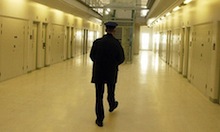
Catholics prisoners in the Six Counties are far more likely to be subjected to violence (or prison ‘discipline’) than their Protestant counterparts, a new report has revealed.
Catholics outnumber Protestants in the North’s prisons by almost two to one, it was also confirmed.
The report on sectarianism in the prison system found that although Protestants form the majority community within the Six County area, just one in three of the prison population is from that community. One in ten are affiliated with neither community, while the remainder, the vast bulk of the prison population, are Catholics.
The report by Anne Owers, former chief inspector of prisons for England and Wales, did not examine the North’s policing and judicial systems, but looked only at how the two communities are treated within the prison system itself.
She found that -- using figures provided by the warders themselves -- Catholic prisoners in Maghaberry prison are three times more likely to be subjected to violence by warders and almost three times as likely to be held on 23-hour lock-up in the punishment block.
In Hydebank Wood young offenders centre, Catholics were also three times more likely to have had violence used against them or had ‘privileges’ removed.
However, the medium security prison Magilligan admitted to the biggest disparity of all. In 95 per cent of cases where violence was used by warders, it was used against Catholics, they admitted.
The report points to the need to address imbalances in religion among prison staff members -- at present less than one in 10 of prison staff are Catholic.
The report significantly makes recommendations to help bring an end to protests by republicans held in Maghaberry prison. Some prisoners are currently on a ‘dirty’ protest -- refusing to conform to prison rules -- over the decision by the prison service to renege on an agreement in relation to strip searches and other prison conditions seen as criminalising political prisoners.
In her report, Ownes claimed that strip-searching was “justified” for security purposes, but “if other less intrusive and more effective electronic methods become available, they should be piloted, and their use considered.”
Prison campaigners have argued for some time that electronic scanning machines are readily available that would remove the need for strip searches without compromising security.
Cart Reilly, spokesman for Republican Network for Unity, a group that represents a number of republican prisoners held in Maghaberry, said the recommendations should be implemented immediately.
“We have been saying for some time now that such technology does in fact exist and so should be introduced in Maghaberry.”
The recommendations also include plans to divide Maghaberry Prison into three smaller jails, to keep short-term, long-term and remand prisoners separated; and compulsory time limits for bringing prisoners to trial -- a move which would affect a number of high-profile republican internees, such as Colin Duffy, who is in his third year at Maghaberry, while ostensibly awaiting trial on IRA charges.
CHANGE?
However, cynicism about the possibility of change in the prison regime in the North has now extended to Owens herself.
She said “little had changed” since an interim report issued in February, which described the North’ prison system as “dysfunctional, demoralised and ineffective”.
Nevertheless, Six-County justice minister David Ford, who commissioned the report, described it as a “watershed” and claimed his department would accept its findings in full.
![[Irish Republican News]](https://republican-news.org/graphics/title_gifs/rn.gif)
![[Irish Republican News]](https://republican-news.org/graphics/title_gifs/harp.gif)

